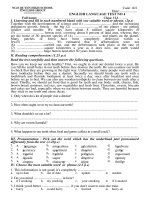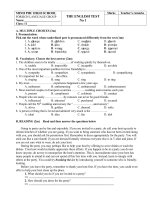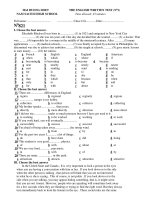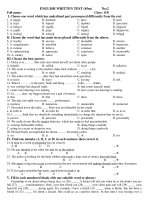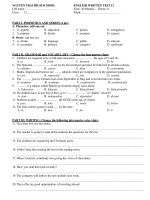English written test (NO 01) ppt
Bạn đang xem bản rút gọn của tài liệu. Xem và tải ngay bản đầy đủ của tài liệu tại đây (134.62 KB, 12 trang )
English written test (NO 01)
Time allowed: 45 minutes (1)
Full name: ………………………… Class:
Mark Teacher’s remark:
I. Listening: Listen to the passage and fill in the missing words. (2đ)
The American family has ……… (1) greatly in the last 30 or 40 years. I think many of these
changes are …………(2) to those in Vietnam and in other parts of the……… (3).You know, young
people are …………(4) longer before getting married and women are also waiting longer to have
children. My parents have……… (5) children, like most families here. Our parents……… (6) us more
equally than parents in the past and we have more freedom to……… (7) our own decision. Our father
is more involved with the……….( 8) because our mother is rather busy with her work in the office.
Your answers:
1…………. 2………… 3…………. 4…………
5………… 6. ………… 7. …………. 8. …………
II. Pronunciation (1đ)
a. Choose one word whose underlined part is pronounced differently from the others.
1. A. helps B. laughs C. likes D. arrives
2. A. wanted B. stopped C. selected D. decided
3. A. missed B. washed C. phoned D. jumped
b. Choose the word whose stress pattern is different from the others
4. A. student B. signal C. instance D. discuss
III. Grammar and vocabulary: Choose the best answer A, B, C or D to complete the following
sentences.(2,5đ)
1. I………… for you for a long time.
A. has waited B. have waited C. am waiting D. was waiting
2. Our parents…………hands to give us a nice house and a happy home
A. join B. shake C. share D. take
3. The students………….up that new word now
A. look B. looked C. are looking D. looks
4. The bride and the groom would pray, asking their ancestor’s………….to get married.
A. permission B. permit C. permissive D. permissibility
5. ……………. generations may live in a home in Vietnam?
A. Who B. What C. How many D. How much
6. We…………here a month ago.
A. came B. come C. were coming D. have come
7. I am afraid I must ask you what you…………….yesterday at 5:30 p.m?
A. do B. did C. were doing D. had done
8. She……… …going for a picnic at weekend.
A. invited B. advised C. agreed D. suggested
9. We are very close – knit family and very supportive…………….one another.
A. with B. of C. for D. at
10. “I am in a hurry.” said Tom. Tom said that he………… in a hurry
A. is B. to be C. was D. been
IV. Read the passage and then answer the questions (2đ)
Some recent research into conversation between men and women has produced results which
will surprise some women. Men always interrupt women when they talk. One researcher feels that men
regard female talk as a kind of conversational housework. They expect women to play a supporting role.
So a man interrupts in a display of dominance or control. Men also have a much more unpleasant
listening style. Whereas a woman uses gestures or says “mm”, a man will say such thing as “right” or
“okey” thus setting the stage for an interruption.
Conversation of this kind is, then, hardly meaningful communication. Male talk is often
argumentative while women are more sensitive, asking more questions and tending to build up their
replies on what the other person has said. The research would indicate that women are better listeners
than men. Yet, listening secretly to conversations between groups of women, one has the impression of
several simultaneous monologues into which no man would be able to get a chance to speak.
1. Do men always interrupt women when they talk?
………………………………………………………………………………………………….
2. What do men expect women to do in conversation?
………………………………………………………………………………………………….
3. What will men say when a woman uses gestures or says “mm”?
…………………………………………………………………………………………………
4. Are men better listeners than women?
…………………………………………………………………………………………………
V. Writing
a. Choose the underlined word(s) that must be changed in order for the sentence to be correctly by
circling letter A, B, C or D.(1đ)
1. We always try to help our parents about household chores
A B C D
2. I am studying here since last September
A B C D
3. He isn’t like his job at the hotel. His parents want him to change it.
A B C D
4. Old- age parents like to live in a nursing home because they want to lead independent lives
A B C D
b. Rewrite these sentences in reported speech. (1,5đ)
1. “Where are you going to spend the holiday?” asked Mike
Mike asked…………………………………………………………………………………….
2. “I haven’t seen my cousin today”, said he
He said…………………………………………………………………………………………
3. “I work for a small publishing company”, Sara said
Sara said……………………………………………………………………………………….
==========The end ==========
English written test (NO 01)
Time allowed: 45 minutes (2)
Full name: ………………………… Class:
Mark Teacher’s remark:
I. Listening: Listen to the passage and fill in the missing words. (2đ)
The American family has ……… (1) greatly in the last 30 or 40 years. I think many of these
changes are …………(2) to those in Vietnam and in other parts of the……… (3).You know, young
people are …………(4) longer before getting married and women are also waiting longer to have
children. My parents have……… (5) children, like most families here. Our parents……… (6) us
more equally than parents in the past and we have more freedom to……… (7) our own decision.
Our father is more involved with the……….( 8) because our mother is rather busy with her work in
the office.
* Your answers:
1…………. 2………… 3…………. 4…………
5………… 6. ………… 7. …………. 8. …………
II. Pronunciation (1đ)
a. Choose one word whose underlined part is pronounced differently from the others
1. A. statements B. dates C. speeds D. books
2. A. watched B. missed C. intended D. looked
3. A. travelled B. warned C. played D. helped
b. Choose the word whose stress pattern is different from the others
4. A. attract B. suppose C. decide D. student
III. Grammar and vocabulary: Choose the best answer A, B, C or D to complete the following
sentences. (2,5đ)
1. I………… such a big fire before.
A.have never seen B.never see C.had never seen D. never saw
2. While I ………… along the road, I saw a friend of mine.
A. had cycled B.have cycled C. cycled D. was cycling
3. Nodding the head can mean that a person is interested …………. the conversation.
A.for B.on C. in D.at
4. She …………… to school every day.
A. goes B. is going C. go D. has gone
5. To American, it is impolite to ask someone about age, …………… and salary.
A. marry B. married C. marriage D. marrying
6. How …………….does she work every day?
A. much B. long C. many D. time
7. “Lan is going to leave for Hanoi tomorrow,” said Hoa.
Hoa said that Lan …………… going to leave for Hanoi the following day.
A. to be B. is C. been D. was
8. He ……………. three sandwiches while you were talking to him yesterday.
A. ate B. has eaten C. eats D. was eating
9. He looks ……………… in his new suit.
A. attract B. attracting C. attractive D. attraction
10. Do you think that the best way of attracting someone’s attention is by …………….
A. to way B. wave C. waved D. waving
IV. Read the passage and then answer the questions (2đ)
Some recent research into conversation between men and women has produced results which
will surprise some women. Men always interrupt women when they talk. One researcher feels that men
regard female talk as a kind of conversational housework. They expect women to play a supporting role.
So a man interrupts in a display of dominance or control. Men also have a much more unpleasant
listening style. Whereas a woman uses gestures or says “mm”, a man will say such thing as “right” or
“okey” thus setting the stage for an interruption.
Conversation of this kind is, then, hardly meaningful communication. Male talk is often
argumentative while women are more sensitive, asking more questions and tending to build up their
replies on what the other person has said. The research would indicate that women are better listeners
than men. Yet, listening secretly to conversations between groups of women, one has the impression of
several simultaneous monologues into which no man would be able to get a chance to speak.
1. Does the research surprise many women?
………………………………………………………………………………………………….
2. What do men expect women to do in conversation?
…………………………………………………………………………………………………
3. Are women better listeners than men?
………………………………………………………………………………………………….
4. What will men say when a woman uses gestures or says “mm”?
…………………………………………………………………………………………………
V. Writing
a. Choose the underlined word(s) that must be changed in order for the sentence to be correctly by
circling letter A, B, C or D (1đ)
1. I have known Bob since five years.
A B C D
2. We are not allow to watch TV all day
A B C D
3. It is said that a happy married should be based on love.
A B C D
4. I often ask my mother for advice before make a decision.
A B C D
b. Rewrite these sentences in reported speech (1,5đ)
1. Mike said, “I am studying Spanish in the evening”.
Mike said …………………………………………………………………………………….
2. “When can I see the doctor?”, Tom asked the receptionist.
Tom asked the receptionist ………………………………………………………………
3. She said, “I saw them at my parents’ house last night.”
She said …………………………………………………………………………………….
==========The end ==========
ANSWER KEY
NO1
I/ listening (2đ- Mỗi từ đúng 0,25đ)
1- changed 3- world 5-two 7- make
2- similar 4-waiting 6- treat 8-housework
II/ Pronunciation (1đ- Mỗi câu đúng 0,25đ)
1-D 2-A 3-C 4-D
III/ Grammar and vocabulary (2,5đ- Mỗi câu đúng 0,25đ)
1- B 2-A 3-C 4-A 5-C
6-A 7-C 8-D 9-B 10-C
IV. Reading (2đ – Mỗi câu đúng 0,5 đ)
1. Yes, they do
2. They expect women to play a supporting role.
3. When a woman uses gestures or says “mm”, a man will say such things as “right” or “okey”
4. No, they aren’t
V/ Writing (2,5 đ)
a. (1đ- Mỗi câu đúng 0,25đ)
1-C 2-B 3- A 4-A
b, (1,5đ) – Mỗi câu đúng 0,5 đ)
1. Mike asked where I was going to spend the holiday.
2. He said he hadn’t seen his cousin that day.
3. Sara said she worked for a small publishing company.
NO2
I/ listening ( 2đ- Mỗi từ đúng 0,25đ)
1- changed 3- world 5-two 7- make
2- similar 4-waiting 6- treat 8-housework
II/ Pronunciation (1đ- Mỗi câu đúng 0,25đ)
1-C 2-C 3-D 4-D
III/ Grammar and vocabulary (2,5đ- Mỗi câu đúng 0,2đ)
1- A 2-D 3-C 4-A 5-C
6-B 7-D 8-A 9-C 10-D
IV. Reading (2đ – Mỗi câu đúng 0,5 đ)
1. No, it doesn’t
2. They expect women to play a supporting role
3. Yes, they are
4. When a woman uses gestures or says “mm”, a man will say such things as “right” or “okey”
V/ Writing (2,5 đ)
a. (1đ- Mỗi câu đúng 0,25đ)
1-C 2-B 3- C 4-D
b, (1,5đ) – Mỗi câu đúng 0,5 đ)
1. Mike said he was studying Spanish in the evening.
2. Tom asked the receptionist when he could see the doctor.
3. She siad she had seen them at her parents’ house the night before.
Tapescrip
The American family has changed greatly in the last 30 or 40 years. I think many
of these changes are similar to those in Vietnam and in other parts of the world. You
know, young people are waiting longer before getting married and women are also
waiting longer to have children. My parents have two children, like most family here.
Our parents treat us more equally than parents in the past and we have more freedom to
make our own decisions. Our father is more involved with the housework because our
mother is rather busy with her work in the office.
English written test (NO 01)
Time allowed: 45 minutes (3)
Full name: ………………………… Class 12….
I. Listening: Listen to the passage and fill in the missing words.(1,5đ)
The American family has ……… (1) greatly in the last 30 or 40 years. I think many of these
changes are …………(2) to those in Vietnam and in other parts of the……… (3).You know, young
people are waiting longer before getting married and women are also waiting longer to have children.
My parents have……… (4) children, like most families here. Our parents treat us more equally than
parents in the past and we have more freedom to……… (5) our own decision. Our father is more
involved with the……….( 6) because our mother is rather busy with her work in the office.
Your answers:
1…………. 2………… 3…………. 4………… 5. ………… 6. ………….
II. Pronunciation (1đ)
Choose one word whose underlined part is pronounced differently from the others
1. A. played B. cooked C. talked D. laughed
2. A. roofs B. boards C. hangs D. clothes
3. A. watches B. trees C. buses D. sentences
4. A. hanged B. earned C. noted D. cleaned
III. Grammar and vocabulary: Choose the best answer A, B, C or D to complete the following
sentences. (3,0đ)
1. The students………….up that new word now
A. look B. looked C. are looking D. looks
2. The bride and the groom would pray, asking their ancestor’s………….to get married.
A. permission B. permit C. permissive D. permissibility
3. ……………. generations may live in a home in Vietnam?
A. Who B. What C. How many D. How much
4. Our parents…………hands to give us a nice house and a happy home
A. join B. shake C. share D. take
5. I am afraid I must ask you what you…………….yesterday at 5:30 p.m.
A. do B. did C. were doing D. had done
6. Jane……… …going for a picnic at weekend.
A. invited B. advised C. agreed D. suggested
7. We are very close – knit family and very supportive…………….one another.
A. with B. of C. for D. at
8. “I am in a hurry.” said Tom. Tom said that he………… in a hurry
A. is B. to be C. was D. been
9. We ………… for you for a long time.
A. has waited B. have waited C. am waiting D. was waiting
10. They …………here a month ago.
A. came B. come C. were coming D. have come
11. I……… my family since I …………… to Ho Chi Minh City.
A. didn’t see/moved B. don’t see/ move C. am not seeing/moved D. haven’t seen/ moved
12. While Diana ……… her favourite television program, there was a power cut.
A. was watching B. watched C. has been watching D. is watching
IV. Read the passage and then answer the questions (2,0đ)
In the past, both men and women were expected to be married at quite young ages. Marriages were
generally arranged by parents and family, with their children having little chance to say no in the matter.
In the past it was not surprising to find that a bride and groom had only just met on the day of their
engagement or marriage.
In modern Vietnam, this has changed completely as people choose their own marriage-partners
based on love, and in consideration primarily to their own needs and wants. Moreover early marriage is
quite illegal.
The traditional Vietnamese wedding is one of the most important of traditional Vietnamese
occasions. Regardless of westernization, many of the age-old customs practiced in a traditional
Vietnamese wedding continue to be celebrated by both Vietnamese in Vietnam and overseas, often
combining both western and eastern elements. Besides the wedding ceremony, there is also an
engagement ceremony which takes place usually half a year or so before the wedding. Due to the
spiritual nature of the occasion, the date and time of the marriage ceremony are decided in advance by a
fortune teller. The traditional Vietnamese wedding consists of an extensive array of ceremonies: the first
is the ceremony to ask permission to receive the bride, the second is the procession to receive the bride
(along with the ancestor ceremony at her house), the third is to bring the bride to the groom's house for
another ancestor ceremony and to welcome her into the family, then the last is a wedding banquet. The
number of guests in attendance at these banquets is huge, usually in the hundreds. Several special dishes
are served. Guests are expected to bring gifts, often money, which the groom and bride at one point in
the banquet will go from table to table collecting.
1. In the past, _________.
A. Vietnamese couples were free to make a decision on the marriage
B. Vietnamese marriage was decided by parents and family
C. getting married at an early age was not allowed
D. parents had no right to interfere their children's marriage
2. In former days, the fact that a bride and groom had only first met just on the day of their engagement
or marriage was _________.
A. surprising B. popular C. uncommon D. strange
3. Which sentence is referred Vietnamese modern marriage?
A. Most young people do not have their marriage based on love.
B. All marriages are arranged by parents and family.
C. Marriage is quite westernization.
D. Couples do not get married at quite young ages.
4. According to the passage, __________.
A. Oversea Vietnamese people do not like to organize a traditional wedding
B. There is an engagement ceremony which takes place usually half a year or so before the wedding
C. Many of the age-old customs practiced in a traditional Vietnamese wedding do not exist
nowadays
D. Vietnamese people never ask a fortune teller the date and time of the marriage ceremony.
V. Writing
a. Choose the underlined word(s) that must be changed in order for the sentence to be correctly by
circling letter A, B, C or D (1đ)
1. We always try to help our parents about household chores
A B C D
2. He is studying here since last September
A B C D
3. He isn’t like his job at the hotel. His parents want him to change it.
A B C D
4. Old- aged parents like to live in a nursing home because they want to lead independent life
A B C D
b. Rewrite these sentences in reported speech(1,5đ)
1. “When will the teacher get back?”, John said
John asked
2. She said, “I’m very proud of my parents.”
She said
3. “I’ve just bought these books for you.” My mother said to me.
My mother told me
==========The end =======
English written test (NO 01)
Time allowed: 45 minutes (4)
Full name: ………………………… Class 12….
I. Grammar and vocabulary: Choose the best answer A, B, C or D to complete the following
sentences: (3,0đ)
1. We …………… to school every day.
A. goes B. is going C. go D. has gone
2. To American, it is impolite to ask someone about age, …………… and salary.
A. marry B. married C. marrying D. marriage
3. How …………….does she work every day?
A. much B. long C. many D. time
4. “Lan is going to leave for Hanoi tomorrow,” said Hoa.
Hoa said that Lan …………… going to leave for Hanoi the following day.
A. to be B. is C. been D. was
5. Tam ……………. three sandwiches while you were talking to him yesterday.
A. ate B. has eaten C. eats D. was eating
6. He looks ……………… in his new suit.
A. attract B. attracting C. attractive D. attraction
7. Do you think that the best way of attracting someone’s attention is by …………….
A. waving B. wave C. waved D. to way
8. We ………… such a big fire before.
A. have never seen B. never see C. had never seen D. never saw
9. While I ………… along the road, I saw a friend of mine.
A. had cycled B. have cycled C. cycled D. was cycling
10. Nodding the head can mean that a person is interested …………. the conversation.
A .for B. on C. at D. in
11. They ….a picnic yesterday because of the awful weather.
A. weren’t having B. isn’t having C. had D. didn’t have
12. By the time we got to the party, they … everything.
A. were eating B. have eaten C. had been eaten D. had eaten
II. Read the passage and then chose the best answer to the questions A, B, C, or D. (2,0đ)
Movements and gestures by the hands, arms, legs, and other parts' of the body and face are the most
pervasive types of nonverbal messages and the most difficult to control. 'It is estimated that there are
over 200.000 physical signs capable of stimulating meaning in another person. For example, there are 23
distinct eyebrow movements, each capable of stimulating a different meaning.
Humans express attitudes toward themselves and vividly through body movements and postures.
Body movements express true messages about feelings that cannot be masked. Because such avenues of
communication are visual, they travel much farther than spoken words and are unaffected by the
presence of noise that interrupt, or cancels out speech.
People communicate by the way they walk, stand, and sit. We tend to be more relaxed with friends
or when addressing those of lower status. Body orientation also indicates status or liking of the other
individual. More direct orientation is related to a more positive attitude.
Body movements and postures alone have no exact meaning, but they can greatly support or reject
the spoken word. If these two means of communication are dichotomized and contradict each other,
some result will be a disordered image and most often the nonverbal will dominate.
1. Which part of body is not used to send body message?
A. stomachs B. legs C. hands D. faces
2. Face gestures ________.
A. cannot express our feelings B. are the most difficult to control
C. can help us control our feelings D. do not include eye brow moments
3. According to the text, body movements cannot express ________.
A. status B. feelings C. attitudes D. desires
4. Nonverbal communication ________.
A. dominates words B. has no relation to verbal communication
C. may be interrupted by noise D. is less common than verbal communication
III. Writing
a. Choose the underlined word(s) that must be changed in order for the sentence to be correctly by
circling letter A, B, C or D (1đ)
1. We are not allowed watching TV all day
A B C D
2. It is said that a happy marriage should be based in love.
A B C D
3. I often ask my mother for advise before making a decision.
A B C D
4. I have know Bob for five years.
A B C D
b. Rewrite these sentences in reported speech(1,5đ)
1. Mike said, “ I was born in 1983.”
Mike said
2. He asked her, “When do you leave this place?”
Tom asked the receptionist ………………………………………………………………
3. She said, “I saw them at my parents’ house last night.”
She said …………………………………………………………………………………….
IV. Pronunciation (1đ)
Choose one word whose underlined part is pronounced differently from the others
1. A. worked B. forced C. caused D. stopped
2. A. roofs B. chairs C. grapes D. hats
3. A. cooked B. watched C. washed D. decided
4. A. wants B. books C. stops D. sends
V. Listening: Listen to the passage and fill in the missing words. (1,5đ)
The American family has ……… (1) greatly in the last 30 or 40 years. I think many of these changes
are …………(2) to those in Vietnam and in other parts of the……… (3).You know, young people are
waiting longer before getting married and women are also waiting longer to have children. My parents
have……… (4) children, like most families here. Our parents treat us more equally than parents in the
past and we have more freedom to……… (5) our own decision. Our father is more involved with
the……….( 6) because our mother is rather busy with her work in the office.
Your answers:
1…………. 2………… 3………….
4………… 5. ………… 6. ………….
==========The end ==========
ANSWER KEY
NO1
I/ listening (1,5đ- Mỗi từ đúng 0,25đ)
1- changed 3- world 5- make
2- similar 4-two 6-housework
II/ Pronunciation (1đ- Mỗi câu đúng 0,25đ)
1-A 2-A 3-B 4-D
III/ Grammar and vocabulary (3,0đ- Mỗi câu đúng 0,25đ)
1- C 2-A 3-C 4-A 5-C 6-D
7-B 8-C 9-B 10-A 11. D 12.A
IV. Reading (2đ – Mỗi câu đúng 0,5 đ)
1. B 2. B 3. D 4. B
V/ Writing (2,5 đ)
a. (1đ- Mỗi câu đúng 0,25đ)
1-C 2-B 3- A 4-D
b, (1,5đ) – Mỗi câu đúng 0,5 đ)
1. John asked me when the teacher would get back
2. She said she she was very proud of her parents.
3. My mother told me she had just bought those books for me.
NO2
I. Grammar and vocabulary: Choose the best answer A, B, C or D to complete the following
sentences: (3,0đ)
1. C 3. B 5. A 7. A 9. D 11. D
2. D 4. D 6. C 8. A 10. D 12. D
II. Read the passage and then chose the best answer to the questions A, B, C, or D. (2,0đ)
1. A 2. B 3. D 4. D
III. Writing (2,5 d)
a. Choose the underlined word(s) that must be changed in order for the sentence to be correctly by
circling letter A, B, C or D (1đ)
1. C 2. D 3. C 4. B
b. Rewrite these sentences in reported speech (1,5đ)
1. Mike said he had been born in……
2. Tom asked the receptionist when she left that place
3. She said she had seen them at her parents’ house the night before
IV. Pronunciation (1đ)
Choose one word whose underlined part is pronounced differently from the others
1. C 2. B 3. D 4. D
V. Listening: Listen to the passage and fill in the missing words. (1,5đ)
1- changed 3- world 5- make
2- similar 4-two 6-housework
Typescript
The American family has changed greatly in the last 30 or 40 years. I think many
of these changes are similar to those in Vietnam and in other parts of the world. You
know, young people are waiting longer before getting married and women are also
waiting longer to have children. My parents have two children, like most family here.
Our parents treat us more equally than parents in the past and we have more freedom to
make our own decisions. Our father is more involved with the housework because our
mother is rather busy with her work in the office.
